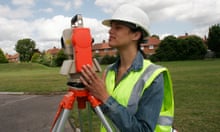The government’s planned cull of technical qualifications could prevent thousands of working-class students going to university to train to be nurses or work in health and social care, just as these professions are struggling with severe staff shortages, vice-chancellors say.
New data from the university admissions service Ucas shows that this year more than 25,000 students who accepted places on social care degrees or subjects allied to medicine had studied a BTec, a qualification the government intends to drop as part of its new skills and post-16 education bill, to be debated in the House of Commons on Monday.
Prof David Green, the vice-chancellor of Worcester University, said: “Withdrawing funding for BTecs could strangle a very important part of the recruitment stream for nursing and other health degrees. It could be a disaster, particularly for students from less affluent socio-economic backgrounds.”
The Ucas figures include careers where there is a national shortage of staff, including nursing, midwifery and radiography. BTec students made up a third of the 74,000 students accepted in these disciplines before clearing in 2021.
With plans to stop funding some BTecs as soon as 2023, university leaders say the move is rushed and ministers have not thought through the consequences for critical caring professions. Latest NHS figures show there are about 39,000 vacancies for registered nurses in England, with one in 10 nursing posts vacant on acute wards in London.
The government wants to drop BTecs so that they do not conflict with its new T-level qualifications for technical subjects. Colleges, universities and unions are campaigning to keep BTecs going as a middle-ground option so students can choose.
Prof Steve West, president of the vice-chancellors’ group Universities UK and head of the University of the West of England, said: “Many students do the health and social care BTec first. They go on to graduate and take up great jobs in the NHS and social care. We simply cannot afford to see that disrupted, given the shortages we are seeing in the workforce.”
The Labour peer David Blunkett and the Conservative peer Kenneth Baker – former education secretaries from opposite sides of the political divide – attacked the move to defund BTecs as a “revolutionary policy” that the government was introducing “on the sly” rather than putting it on the face of the new bill.
Writing for the Guardian, they said T-levels were suitable for students with the highest grades of GCSEs: 6–9. “They would be out of reach of those students with lower grades, who presently take up a broad and highly relevant employment-focused BTec.”
Under the new plans, which focus on paring down the number of vocational courses on offer, 16-year-olds will choose either to study A-levels or train for a skilled job with T-levels, which include a three-month work placement.
A new health T-level was launched in September. However, last year fewer than 1,300 students started studying for a T-level, compared with 250,000 young people who took a BTec national diploma. Universities say the marketing for the new health T-level does not mention careers such as nursing or midwifery.
Dr John Cater, vice-chancellor of Edge Hill University in Lancashire, said: “T-levels are just coming into existence, while BTecs are being withdrawn. The transition is likely to be painful and slow. I worry that there is a generation of young people who could suffer while that transition takes place.”
Cater said that BTecs, which are vocational but combine practical and academic training and can be taken alongside A-levels, were more likely to be chosen by students from poorer backgrounds.

Jayna Goauder, who grew up in care and is now in the second year of a social work degree at Canterbury Christ Church University, says: “I loved doing my health and social care BTec. I went into classes and it all just came naturally, which confirmed to me that this is definitely what I want to do.”
Goauder studied two A-levels as well, but says the coursework element of the BTec suited her better. “The BTec gave me a great base for my degree,” she says. “Why are they funnelling money, energy and time into changing qualifications which work and are accessible?”
Sean Domingo, who grew up on the Isle of Man and is now in his second year training to be a nurse paramedic at Edge Hill University, says that without his health and social care BTec, which he started at the age of 23 after leaving school at 16, he would not have gone to university. He liked the mixture of practical and academic learning, and says the coursework assessment rather than exams suited him because he has dyslexia. “The majority of my class did BTecs, so without them you wouldn’t have 30 brand new nurse paramedics training on a pioneering course.”
Research by the Social Market Foundation thinktank showed that 44% of white working-class students who go to university have studied at least one BTec, and 37% of black students who go have entirely BTec qualifications.
Prof Rama Thirunamachandran, chair of the Million Plus group of modern universities and the vice-chancellor of Canterbury Christ Church University, said: “BTecs bring into the university system students who are talented and have the potential but perhaps don’t have the academic achievements as they aren’t in schools that are heavily geared towards A-levels.” He said the government should be giving T-levels time to “bed down”.
A spokesperson for the Department for Education said the health T-level was created with employers, including the NHS, and would prepare students who wanted to study subjects at university including nursing and midwifery. “We are not abolishing all BTecs. We will be led by the evidence and will continue to fund BTecs or similar qualifications where there is a clear need for them and so that all young people have access to high-quality options. These could include health and social care qualifications that could be studied alongside A-levels.”








